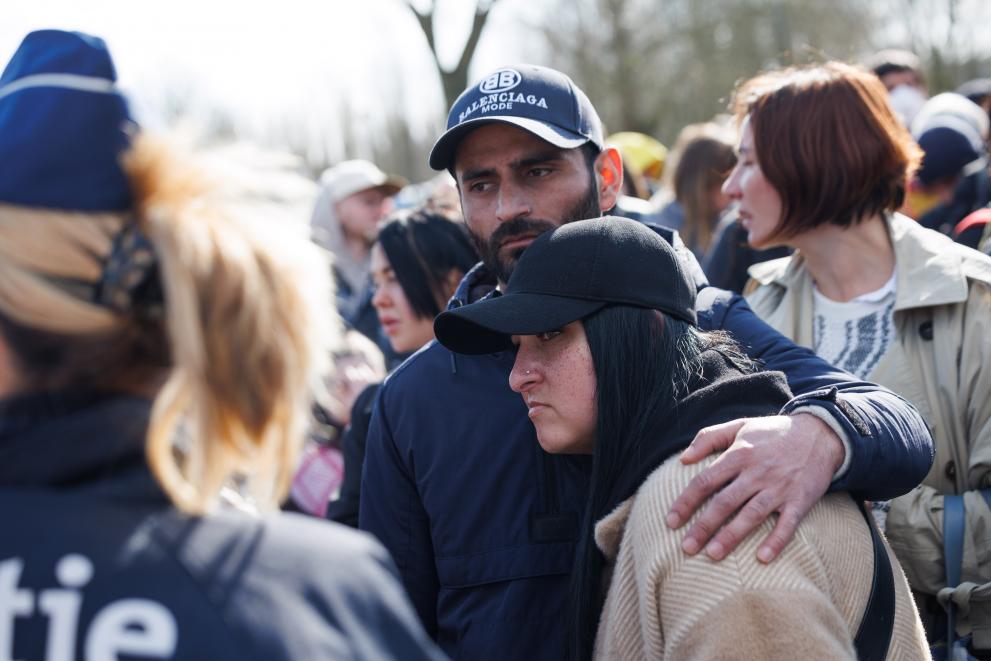
To respond to this unprecedented situation, the EU agreed in record time to activate the Temporary Protection Directive to help people fleeing war in Ukraine. The Directive became immediately applicable on 4 March and now offers immediate protection and a clear legal status to millions of people.
Today, the Commission is presenting operational guidelines to support Member States in applying the Directive. The comprehensive guidelines will help those arriving to have a consistent and effective level of rights and the Member States to assume their new responsibilities.
Vice-President for Promoting our European Way of Life, Margaritis Schinas said: “The unprecedented decision to grant immediate protection to all those who call Ukraine their home is now being translated into practice. To help make this process as smooth as possible, the Commission is supporting Member States with operational guidance. For example, to ensure people can move around the Union unhindered, we clarify that they should be able to receive 15 day visas at the border and that in any case carriers should not be fined for transporting them without documentation. One of the biggest concerns now is the number of children arriving unaccompanied who need to be registered and given specialised care.”
Commissioner for Home Affairs, Ylva Johansson said: “In a matter of days, 3 million people crossed into the EU. The show of solidarity has been immense and the reaction of the authorities impressive; but real challenges exist to ensure national systems do not become overwhelmed and that people enjoy the protection they deserve. Based on questions from Member States, we are proposing the following operational guidelines which we will regularly update to make sure the Commission supports Member States every step of the way – from arrival to integration.”
Guidelines to Member States
The guidelines are intended as a living document to reflect the situation on the ground and take due consideration of the evolving needs of the Member States. The main elements include:
- Clarifying who is entitled to temporary protection, including for instance those persons who benefitted from international protection or an equivalent national protection in Ukraine before 24 February and who have been displaced from Ukraine on or after 24 February, as well as their family members.
- A definition of “adequate protection” under national law which is a possible alternative to temporary protection that may be offered by Member States and does not have to be identical, but which must respect the Charter of fundamental rights of the European Union and the spirit of the Temporary Protection Directive. The respect for human dignity and therefore a dignified standard of living has to be ensured in respect of everyone.
- Specifying the type of evidence needed to benefit from temporary protection or adequate protection under national law.
- Encouraging Member States to consider extending temporary protection to persons who strictly-speaking would not fall under the scope of application of the Decision but who need protection such as those who fled Ukraine not long before 24 February 2022
- Children: the Guidelines include a dedicated chapter on children. Unaccompanied children and teenagers should be immediately appointed with a legal guardian or appropriate representation. The Commission is also coordinating relocation efforts for the transfers of unaccompanied children and teenagers to other Member States. All children fleeing from the war, regardless of their status, should have full protection and swift access to their specific rights (including education, healthcare, psychosocial assistance).
- Guidelines on specific rights under the Temporary Protection Directive: a residence permit should serve as a document to prove someone's status with other authorities, such as employment offices and services, schools, hospitals. Where residence permits are still pending, Member States should facilitate the opening of bank accounts and access to relevant services on the basis of an ID document or proof of entry into the EU after 24 February 2022.
- Guidelines to ensure free movement both before and after issuance of residence permits: Ukrainian nationals holding biometric passports or nationalities exempt from the requirement to be in possession of a short-stay visa for entering the Union, have the right to move freely within the Schengen area after being admitted into the territory for a 90-day period within a 180-day period. For non-visa exempt nationalities, the Commission recommends that Member States of first entry issue 15-day visas as the border and that secondary Member States do not impose financial penalties on carriers transporting persons enjoying temporary protection but not in possession of valid documents to enter. After a residence permit is issued, persons with temporary protection have the right to move freely.
- Providing repatriation assistance for those with no right to stay in the EU, such as the need to receive consular assistance for repatriation, which Frontex can support.
Background
On 4 March 2022, following the Commission's proposal the previous day, the Council unanimously adopted the implementing decision introducing temporary protection for people fleeing war in Ukraine. After this decision, the Commission received a clear demand for further information and launched a webpage to inform and support those fleeing war when arriving in the EU.
To coordinate operational support for Member States of first entry, the Commission has been convening meetings on the situation in Ukraine as part of the EU Migration Preparedness and Crisis Blueprint. Alongside this Network, a ‘Solidarity Platform' coordinated by the Commission is collecting and examining Member States' needs in order to provide an operational response. These guidelines will also complement the existing Guidelines for external border management to facilitate border crossings at the EU-Ukraine borders.
For More Information
Operational Guidelines for the implementation of Council implementing Decision introducing temporary protection
Council Implementing Decision introducing temporary protection
Details
- Publication date
- 18 March 2022
- Author
- Representation in Cyprus
